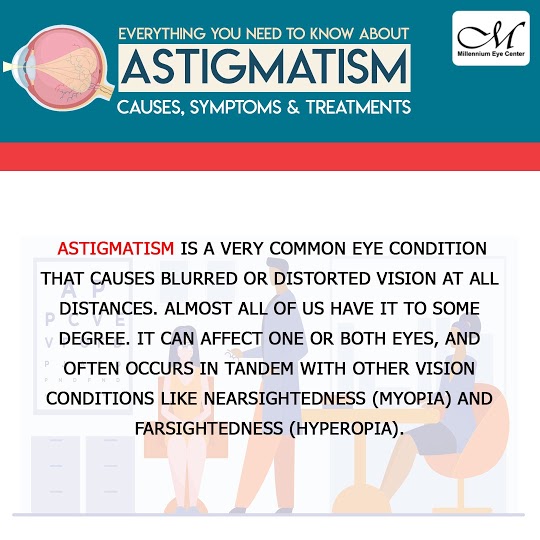Astigmatism may be one of the most commonly misunderstood eye conditions. Many believe it’s caused by improper lighting, that it can lead to more serious eye problems, or—something we’ve all likely thought at some point—that it’s called “astigmatism.”
The Basics Of Astigmatism
So let’s clear the air here: the term “astigmatism” comes from the Greek “a” (without) and “stigma” (point or mark). Astigmatism is a type of refractive error in which the eye does not focus light evenly on the retina. Astigmatism is caused when the lens, cornea, or both are not completely smooth, and therefore do not perfectly focus light as it enters your eye, leaving you with blurry vision.
Astigmatism and other refractive errors, like myopia (nearsightedness) and hyperopia (farsightedness), are usually genetic and develop naturally, often from birth or during childhood. Astigmatism is diagnosed through Eye Exam.
Astigmatism Symptoms
The symptoms of astigmatism may differ in each person. Some people don’t have any symptoms at all. The symptoms of astigmatism include:
- blurry, distorted, or fuzzy vision at all distances (up close and far away)
- difficulty seeing at night
- eyestrain
- squinting
- eye irritation
- headaches
- Trouble focusing
- Blurry sight
- Trouble driving at night
Astigmatism Treatment
Prescription eyeglasses or contact lenses and refractive errors surgery such as LASIK.
Different People Experience Different Levels Of Astigmatism
Astigmatism is actually very common. Astigmatism is a type of refractive error in which the eye does not focus light evenly on the retina. Many of us have some level of astigmatism, but it’s not enough to warrant corrective treatment. Other patients with severe astigmatism may experience other symptoms.
Trust A Professional To Provide The Best Solution For Your Individual Case
There can be many variables involved in astigmatism: the shape and focus of the eye, differences between the two eyes, and, often, additional complications of nearsightedness or farsightedness.
Astigmatism can range in severity, and call for different treatments in different patients, whether that means eyeglasses, contact lenses, or corrective surgery.
With a comprehensive eye exam, your optometrist can check your visual acuity and focus.
They can survey the curvature of your cornea and determine the very best treatment option for your eyes, and your lifestyle.
Talk to us about your vision! We’ll keep you seeing your best.
Thanks for being a valued part of our patient family. For any question about your eye health, please call us at 407-292-9812.
Top image by Flickr user Oscar Rethwill used under Creative Commons Attribution-Sharealike 4.0 license. Image cropped and modified from original.
The content on this blog is not intended to be a substitute for professional medical advice, diagnosis, or treatment. Always seek the advice of qualified health providers with questions you may have regarding medical conditions.

